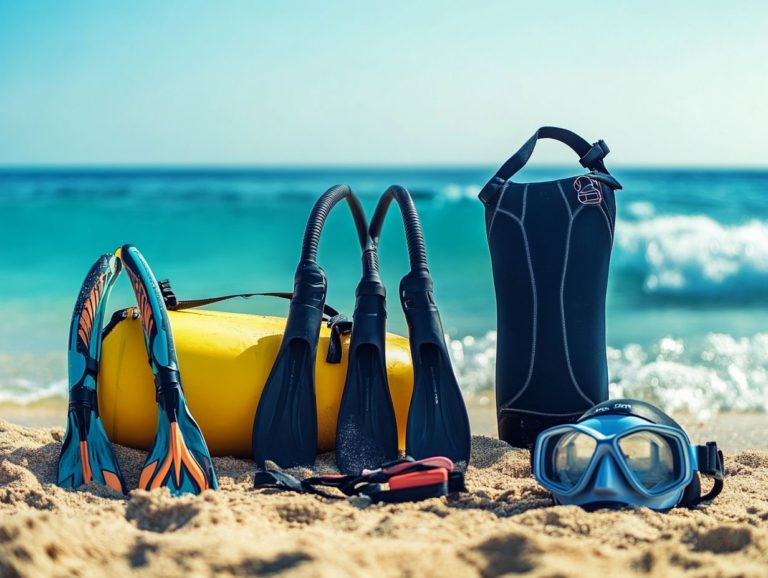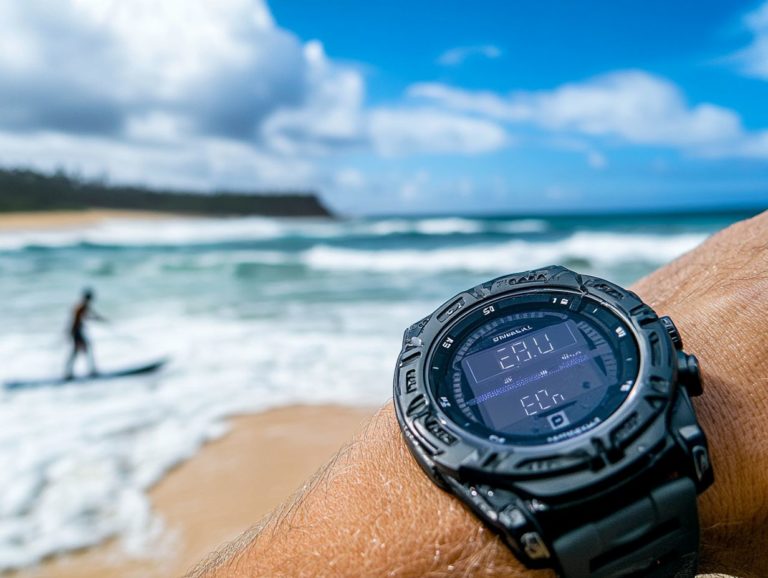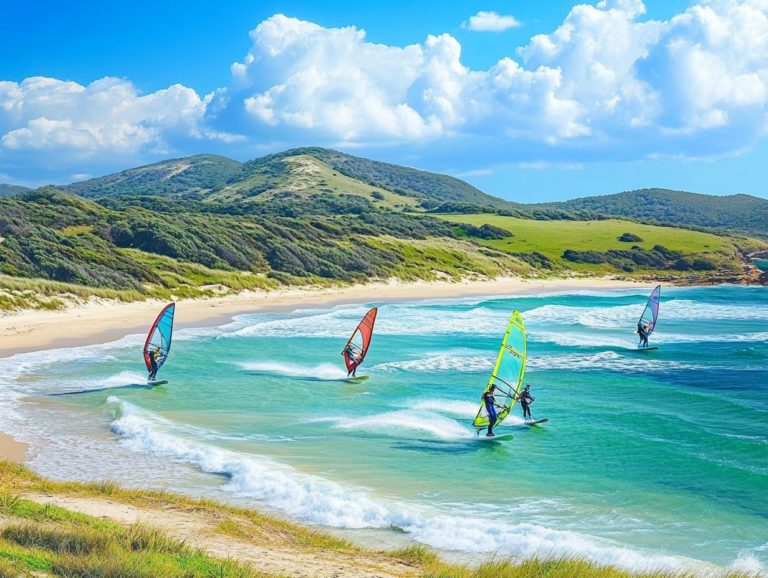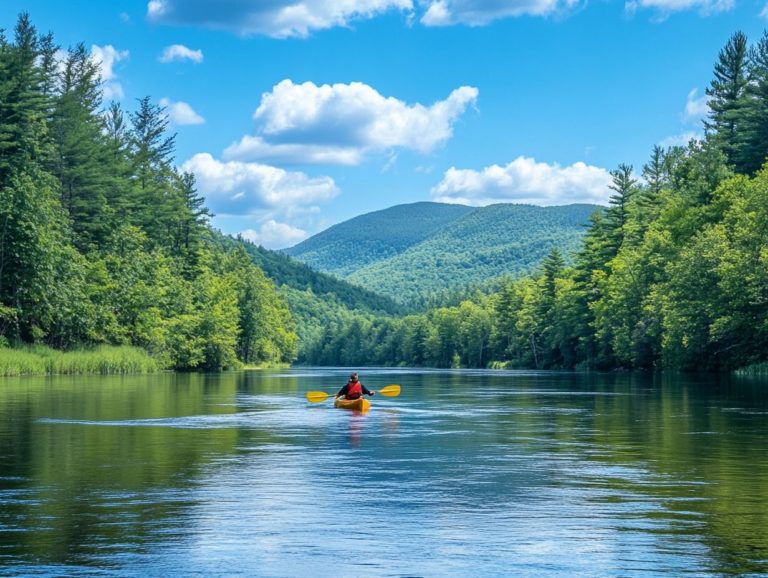How to Prepare for Your First Dive
Scuba diving presents an exhilarating opportunity to immerse yourself in the enchanting underwater realm, teeming with vibrant marine life and stunning vistas. Get ready to dive into an adventure like no other!
Before you start this adventure, understand the many benefits it offers. These benefits are both physical and mental. This guide will encompass everything you need to know, from preparing for your inaugural dive and selecting essential gear to pinpointing the ideal dive location.
You will learn key safety tips and post-dive care practices to guarantee a secure and enjoyable experience.
Contents
- Key Takeaways:
- Benefits of Scuba Diving
- Preparing for Your First Dive
- Essential Gear for Scuba Diving
- Choosing a Dive Location
- Safety Tips for Scuba Diving
- Post-Dive Care and Maintenance
- Frequently Asked Questions
- What are the necessary steps to prepare for my first dive?
- Are there any skills or techniques I should learn before my first dive?
- What should I do to ensure my safety during my first dive?
- How should I mentally prepare for my first dive?
- What should I expect during my first dive?
- Is there anything else I should keep in mind before my first dive?
Key Takeaways:
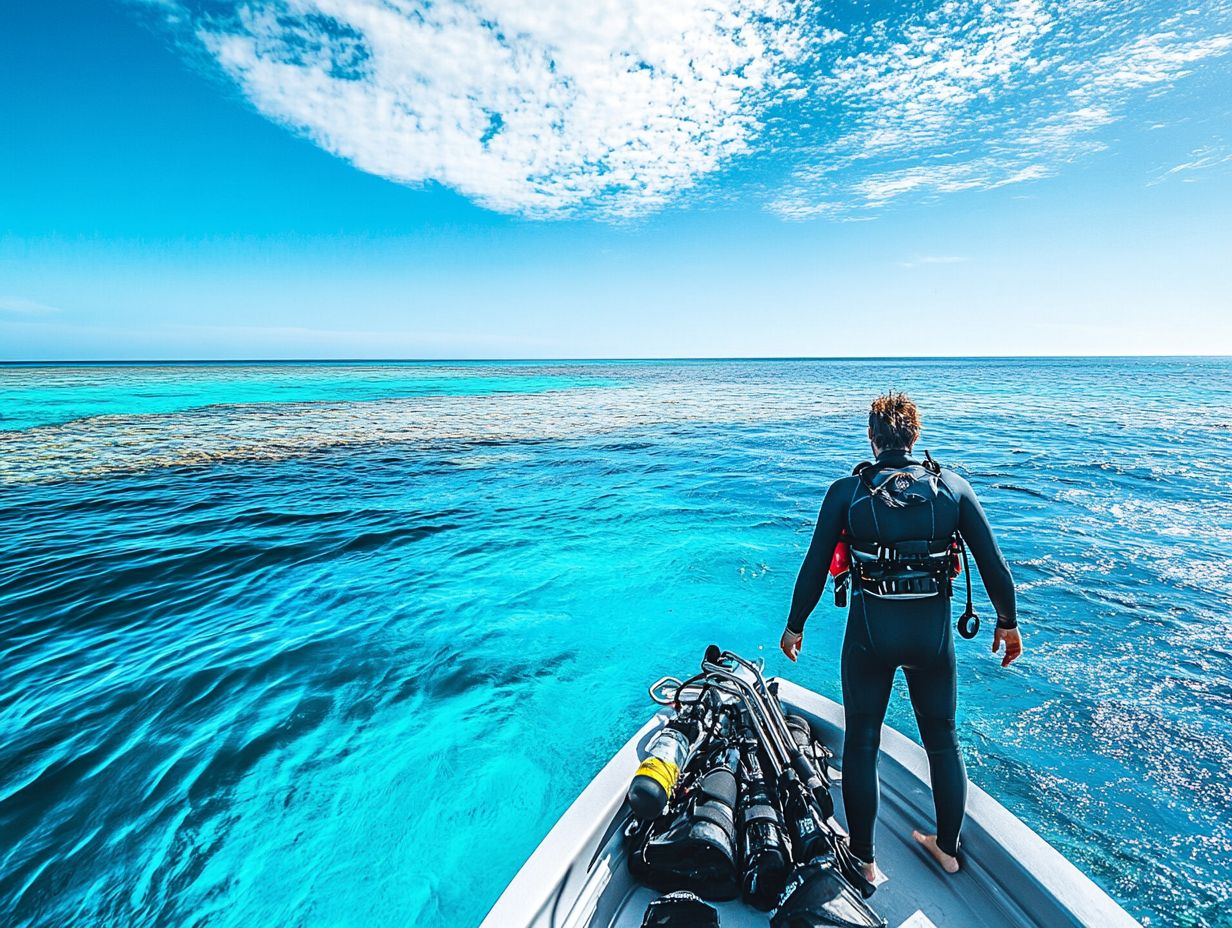
- Proper physical and mental preparation is key for a safe and enjoyable first dive.
- Invest in essential gear and familiarize yourself with emergency procedures to ensure a successful dive.
- Consider factors such as water temperature and visibility when choosing a dive location.
What is Scuba Diving?
Scuba diving is your ticket to an exhilarating underwater adventure, allowing you to delve into a breathtaking world filled with vibrant marine life and unique sea creatures. As a scuba diver, you will be equipped with specialized gear and techniques to navigate diverse dive sites, uncover hidden treasures, and engage in ocean exploration.
This thrilling activity requires proper training and knowledge, often gained through scuba diving courses and certification programs like those from PADI, ensuring both your safety and a rewarding diving experience.
The origins of scuba diving stretch back to ancient civilizations, where early divers relied on simple tools for underwater tasks. However, the sport truly transformed in the mid-20th century with the advent of pressurized air tanks and modern regulator systems.
Today, you can choose from an array of dive types, including wreck diving, reef diving, and cave diving, each presenting its own exciting thrills and challenges.
Dive instructors are instrumental in guiding you through these experiences, teaching essential skills while ensuring you are armed with the latest diving equipment. Your journey into scuba diving is not merely about personal adventure; it is a gateway to understanding and protecting our precious oceans.
Benefits of Scuba Diving
Scuba diving presents many benefits, enhancing both your physical health and mental well-being, making it a truly exceptional activity that contributes to your overall fitness and relaxation.
As you immerse yourself in the underwater world, you engage your body through swimming and buoyancy control, all while enjoying a rejuvenating escape from the stresses of daily life. This unique experience not only helps in managing anxiety but also significantly boosts your mental health.
Diving trips let you connect deeply with nature, explore breathtaking environments, and expand your understanding of marine ecosystems.
Physical and Mental Health Benefits
The physical and mental health benefits of scuba diving are impressive, backed by research that shows how regular diving can enhance cardiovascular fitness, boost muscle strength, and improve respiratory function. The immersive experience of exploring the underwater world offers not just relaxation but also mental stimulation, making it a superb way to manage anxiety and stress.
With the right fitness and mental preparation techniques think visualization you can truly maximize these health benefits while reveling in your time beneath the waves.
Incorporating specific exercises like swimming, strength training, and flexibility routines can significantly elevate your overall performance as a diver. Practicing breathing techniques, such as diaphragmatic breathing, not only helps you maintain calm during dives but also optimizes oxygen consumption essential for those longer underwater ventures.
Effective dive planning is crucial; you need to consider your physical capabilities and any health issues that might arise, such as decompression sickness. By prioritizing both physical fitness and mental readiness, you can cultivate a balanced approach to your underwater adventures, ensuring that each dive is not just safe but also deeply enjoyable.
Start your scuba diving journey today!
Preparing for Your First Dive
Preparing for your first dive marks a thrilling milestone in your scuba diving journey. It demands careful planning and the guidance of seasoned dive instructors.
Enrolling in PADI courses provides you with essential knowledge and skills, covering safety measures, fundamental techniques, and invaluable diving tips before you plunge into your underwater adventure.
A trustworthy dive buddy enhances your experience. Recognizing the significance of properly fitting gear will elevate your diving, ensuring that your exploration of the mesmerizing underwater world is both safe and enjoyable.
Physical and Mental Preparation
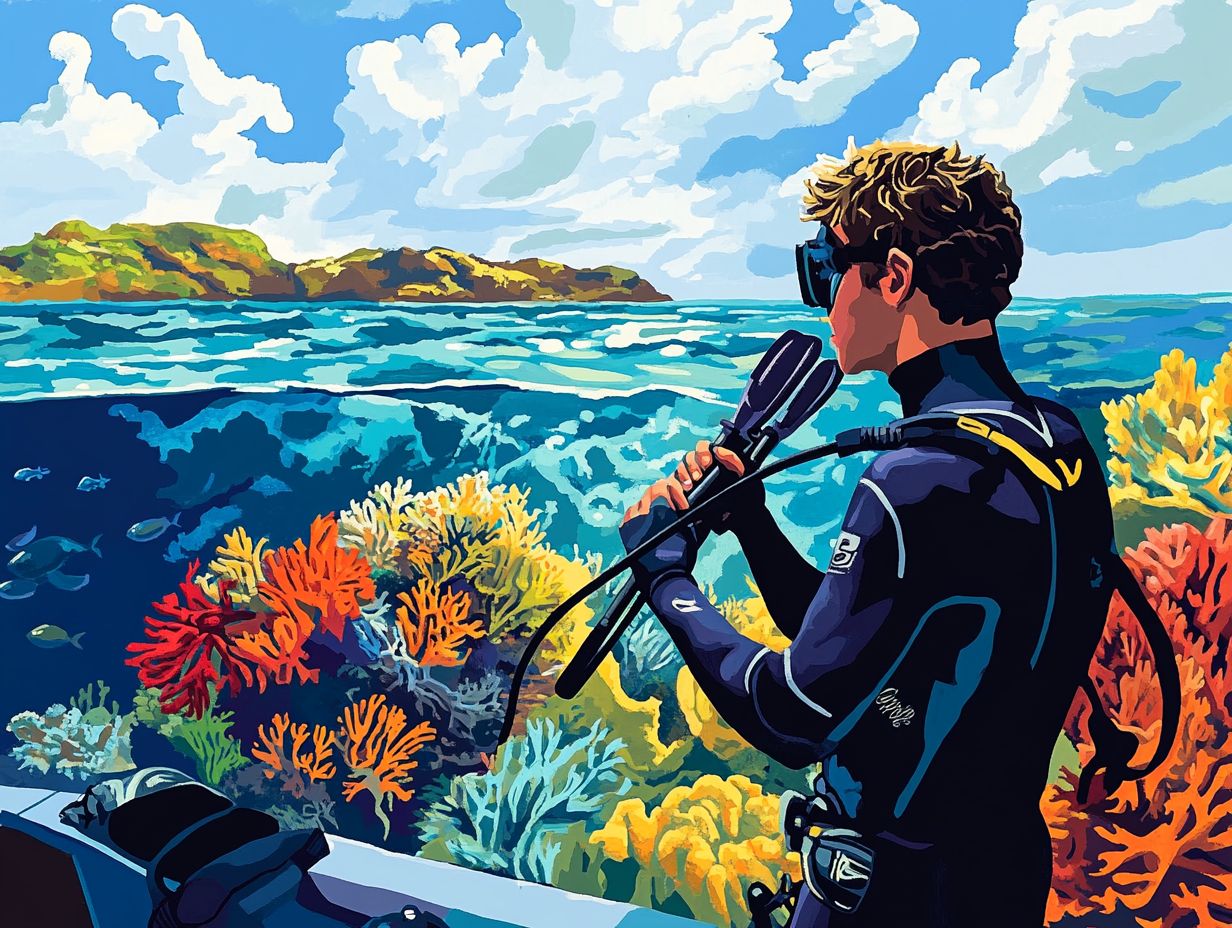
Physical and mental preparation are vital for ensuring your first dive is not only successful but also enjoyable. Engaging in fitness routines think cardiovascular training and strength exercises will boost your stamina and enhance your buoyancy control.
On the mental side, techniques like visualization can help you manage any pre-dive anxiety and build your confidence. Together, these strategies equip you to tackle the challenges of scuba diving, making your underwater adventure all the more delightful.
Specifically, you can benefit from breathing techniques such as diaphragmatic breathing, which calms your nervous system and improves oxygen efficiency. Incorporating anxiety management strategies like mindfulness and meditation can be invaluable in those moments of overwhelm before a dive.
Dive training sessions that simulate underwater scenarios provide practical experience, allowing you to become familiar with the gear and conditions. This familiarity reduces anxiety when it’s time to dive for real.
By blending physical drills with mental exercises, you create a comprehensive training approach that prepares you to fully embrace the exhilarating journey beneath the waves.
Essential Gear for Scuba Diving
Gear up with the right diving equipment to dive into adventure! Proper diving equipment like buoyancy control devices (BCD), which help you float in the water, and dive computers serves as the backbone of a successful dive.
By familiarizing yourself with the different types of diving equipment available and understanding how to maintain them, you elevate your diving experience and enhance your safety as a diver.
What You Need for a Safe and Enjoyable Dive
To ensure your dive is both safe and enjoyable, invest in quality scuba equipment, such as:
- wetsuit
- fins
- dive computer
Familiarizing yourself with safety measures, proper breathing techniques, and emergency procedures will enable you and your dive partner to handle any situation that may arise during your underwater adventure.
It’s important to carry extra safety items, such as:
- surface marker buoy
- whistle
A dependable dive instructor can assist you in selecting the right gear and emphasize the importance of dive planning and buddy checks.
Establishing clear communication signals with your dive partner before you descend can enhance safety even further. Remember, knowing how to respond in case of equipment failure or other emergencies can transform your diving experience from stressful to seamless.
Choosing a Dive Location
Selecting the perfect dive location is essential for truly savoring the wonders of scuba diving. Factors such as visibility, water temperature, and the richness of marine life significantly impact your overall experience.
Renowned dive sites, like those found in the Red Sea and Aqaba, offer breathtaking underwater ecosystems, diverse depths, and exceptional visibility making them a haven for both novice and seasoned divers alike.
Understanding the unique features of your dive location ensures an unforgettable adventure. Don t miss out on the stunning marine life!
Factors to Consider and Popular Destinations
When selecting a dive location, it’s essential to weigh several factors, such as visibility, water temperature, and the presence of marine life, to elevate your underwater experience.
The Red Sea is celebrated for its rich biodiversity and vibrant coral reefs. These sites draw divers from across the globe. By evaluating these key factors, you can pinpoint the ideal dive sites that resonate with your skills and preferences.
Environmental elements like currents and tides are crucial for ensuring your safety underwater, particularly if you’re still honing your diving skills. Personal preferences also matter think about whether you want to encounter colorful tropical fish or perhaps the majesty of sharks. Accessibility of the location, combined with trustworthy dive trip operators, can significantly enhance your overall experience.
By taking the time to assess these critical elements, you can get ready for unforgettable ocean adventures tailored just for you!
Safety Tips for Scuba Diving
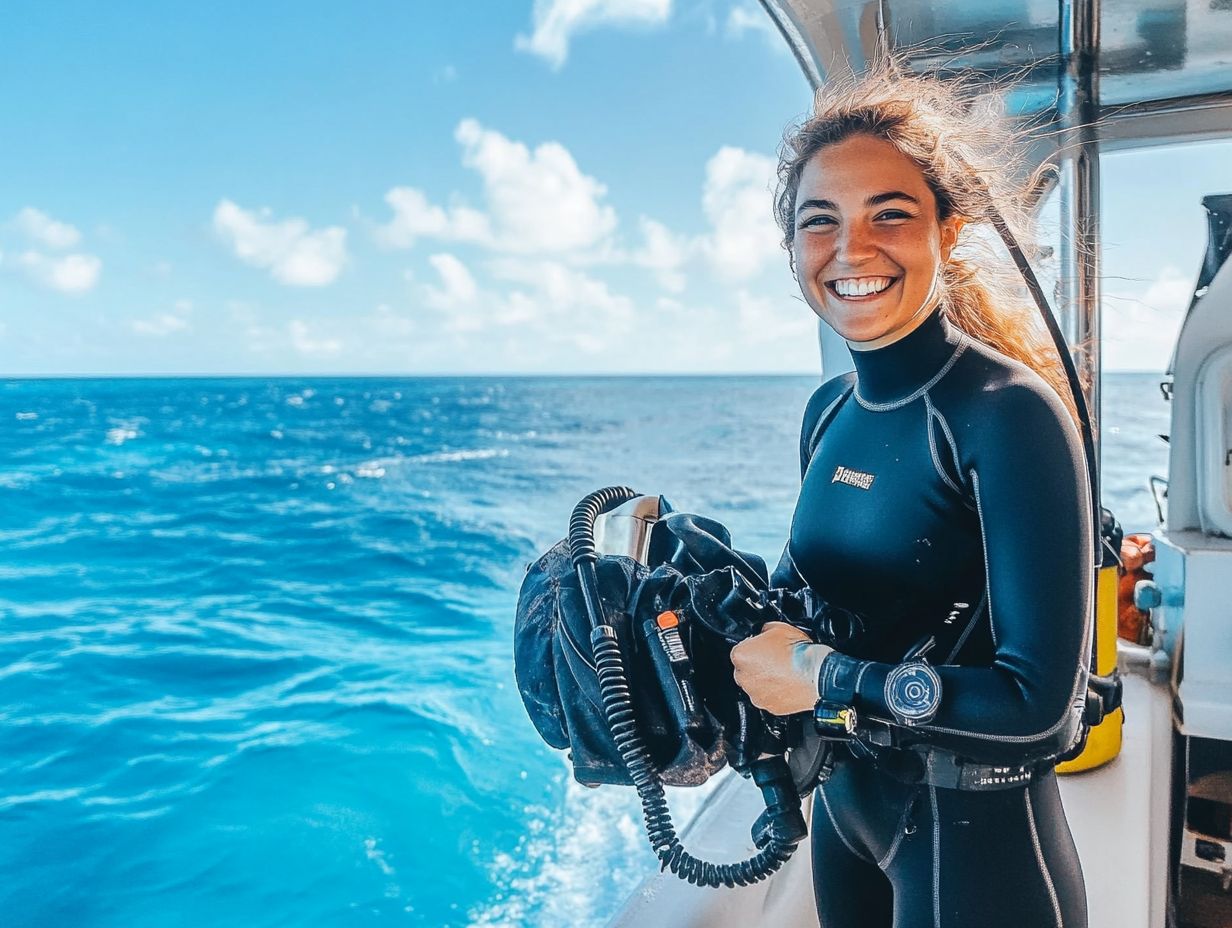
Implementing proper safety tips for scuba diving is crucial for ensuring a safe and enjoyable experience. This includes:
- Conducting thorough pre-dive safety checks.
- Maintaining effective communication with your dive buddy.
- Being aware of potential health concerns like decompression sickness, a condition caused by ascending too quickly.
Familiarizing yourself with emergency procedures equips you to respond swiftly and effectively in unforeseen circumstances while you’re underwater.
Precautions and Emergency Procedures
Taking necessary precautions and understanding emergency procedures are not just advisable; they are crucial elements of diving safety that you should prioritize as a scuba diver. Being aware of potential health issues like nitrogen narcosis, a temporary condition caused by breathing nitrogen at deep depths, and decompression sickness can significantly mitigate risks during your underwater adventures.
Practicing emergency procedures such as addressing equipment failures or recognizing signs of distress in your dive buddy ensures that you are fully prepared for any situation that may arise.
Proper dive training cultivates awareness of these safety measures, equipping you with the vital skills to respond effectively when challenges occur underwater. Familiarizing yourself with your gear and conducting thorough pre-dive checks can help avoid equipment malfunctions. Additionally, mastering emergency ascent techniques and effective communication signals with your dive partners can further enhance your safety.
Understanding the importance of a robust emergency response plan, which includes first aid training and knowledge of local protocols, provides an extra layer of security. Ultimately, this preparation allows you to enjoy more worry-free diving experiences, making each dive not just safe, but truly memorable.
Post-Dive Care and Maintenance
Post-dive care and maintenance are crucial for preserving your diving equipment and safeguarding your well-being after each dive. Rinse your scuba gear with fresh water. Let it dry completely to keep it in top condition.
This simple practice helps prevent damage from saltwater and extends the lifespan of your gear. Moreover, don t overlook self-care tips like staying hydrated and incorporating some stretching into your routine.
These habits can significantly enhance your recovery after a diving excursion, preparing you for the exhilarating underwater adventures that lie ahead.
Proper Gear Cleaning and Self-Care Tips
Proper gear cleaning and self-care tips are essential for maintaining your scuba gear and ensuring a smooth recovery after your dive. Rinsing your equipment with fresh water and letting it air dry will keep salt and debris at bay. A thorough inspection for any damage is vital for your safety on future dives.
Engaging in self-care practices like staying hydrated, eating well, and incorporating gentle stretching will boost your recovery and prepare you for the next underwater adventure!
To dive deeper into gear maintenance, pay special attention to individual items like regulators and buoyancy control devices (BCDs), which help you maintain your position in the water. Regularly flushing your regulators with fresh water after each dive helps eliminate harmful residues. Checking O-rings and hoses for wear is crucial.
For your wetsuit, a thorough rinse followed by drying it inside out will prevent mold and extend the life of the fabric. Remember, your dive equipment is an investment, and diligent care can save you from expensive replacements.
Pair these practices with a balanced diet and plenty of fluids to boost your physical well-being and elevate your overall dive performance.
Frequently Asked Questions
What are the necessary steps to prepare for my first dive?
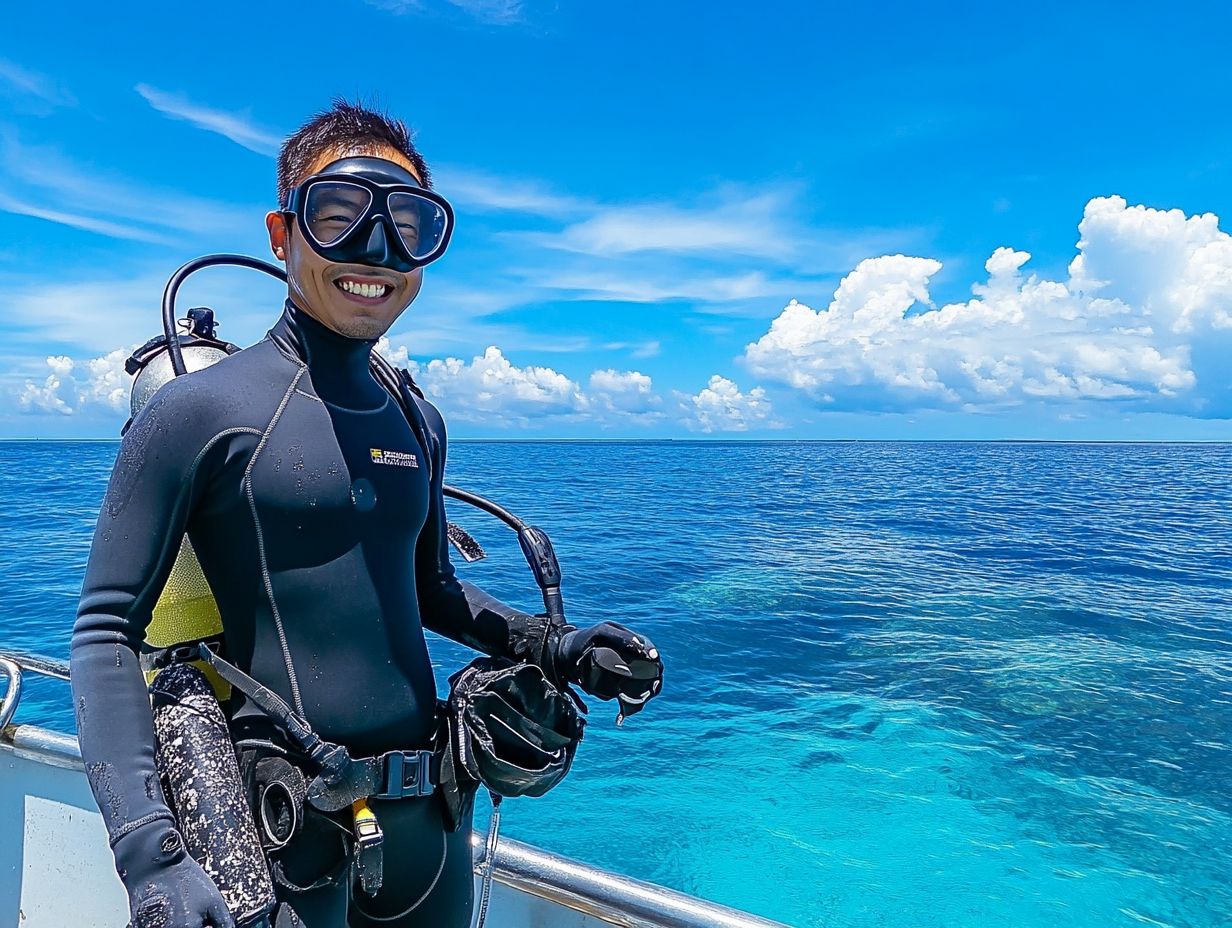
To prepare for your first dive, research and choose a reputable diving school or instructor. Ensure you have a valid diving certification, proper equipment, and a dive buddy.
It’s also important to stay hydrated, get a good night’s sleep, and eat a light meal before your dive.
Are there any skills or techniques I should learn before my first dive?
Yes, it is recommended to take a basic scuba diving course to learn essential skills and techniques before your first dive. This will include proper breathing, equalizing pressure, and communication signals, among others.
It is also helpful to practice these skills in a pool or shallow water before attempting a deeper dive.
What should I do to ensure my safety during my first dive?
Aside from learning proper diving skills and techniques, it is important to listen to your instructor and follow all safety guidelines. Always check your equipment before diving, and make sure to dive within your limits and comfort level.
If you feel uncomfortable or encounter any issues, communicate with your dive buddy and instructor immediately.
How should I mentally prepare for my first dive?
Mental preparation is just as important as physical preparation for your first dive. It’s normal to feel nervous or anxious, but you can ease your mind by visualizing a successful and enjoyable dive.
Remind yourself of all the safety procedures and skills you have learned, and trust in your training and equipment.
What should I expect during my first dive?
During your first dive, expect to feel weightless and experience a new environment full of vibrant marine life. Your instructor will guide you through the dive and point out interesting creatures and features.
It’s normal to feel a little disoriented at first, but focus on your breathing and enjoy the experience.
Is there anything else I should keep in mind before my first dive?
Make sure to communicate any medical conditions or concerns with your instructor before diving. It’s also important to respect the marine environment and follow proper diving etiquette.
Finally, have fun and enjoy the unique experience of your first dive!

